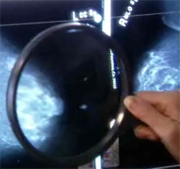
TUESDAY, April 15, 2014 (HealthDay News) — A new blood test may one day help predict the recurrence of breast cancer and also a woman’s response to breast cancer treatment, researchers report.
“We are able to do this with literally a spoonful of serum [blood],” said study co-author Saraswati Sukumar, who is co-director of the breast cancer program at the Sidney Kimmel Comprehensive Cancer Center at Johns Hopkins University School of Medicine, in Baltimore.
Once a patient’s blood is collected, the researchers isolate circulating tumor DNA. The genetics test then detects any of 10 breast cancer-specific genes that have undergone what experts call hypermethylation.
In the hypermethylation process, the activity of some genes that keep cancers in check is turned off, and that may signal a return of the cancer.
The new study is published April 15 in the journal Cancer Research.
The test, called the cMethDNA, is at least five years from being available on the market, Sukumar predicted.
Using this test, researchers could use the gene activity as an indication that the cancer had returned, and could also use it to see if treatments are working, Sukumar said. The blood test seems to indicate recurrences earlier than they could be found by imaging, she added.
Other blood tests are on the market with the same aim, but are considered unreliable, said Sukumar and another breast cancer expert.
Doctors typically rely on patient complaints, along with imaging studies, to determine if a cancer has returned after treatment.
The new test was given to 55 healthy women and 57 who had breast cancer that had spread.
“The test is able to detect [accurately] more than 90 percent of those who have recurrent cancer,” Sukumar said. About 9 percent of cancer recurrences were misread as a negative result, she said.
Dr. Joanne Mortimer, director of women’s cancer programs at the City of Hope Comprehensive Cancer Center, in Duarte, Calif., said, “There is reason to be optimistic, and to study this further.”
However, Mortimer, who was not involved with the new research, said the study only included a small number of patients and more study is needed.
“This is incredibly needed,” she added, as other tests on the market aren’t very reliable.
According to Mortimer, the worst part of being treated for early stage breast cancer for patients is the period after treatment is over. “Then they live with this uncertainty. They may be cured, they may not. And only time will tell.”
More information
To learn more about breast cancer recurrence, visit Johns Hopkins University School of Medicine.
Copyright © 2026 HealthDay. All rights reserved.

